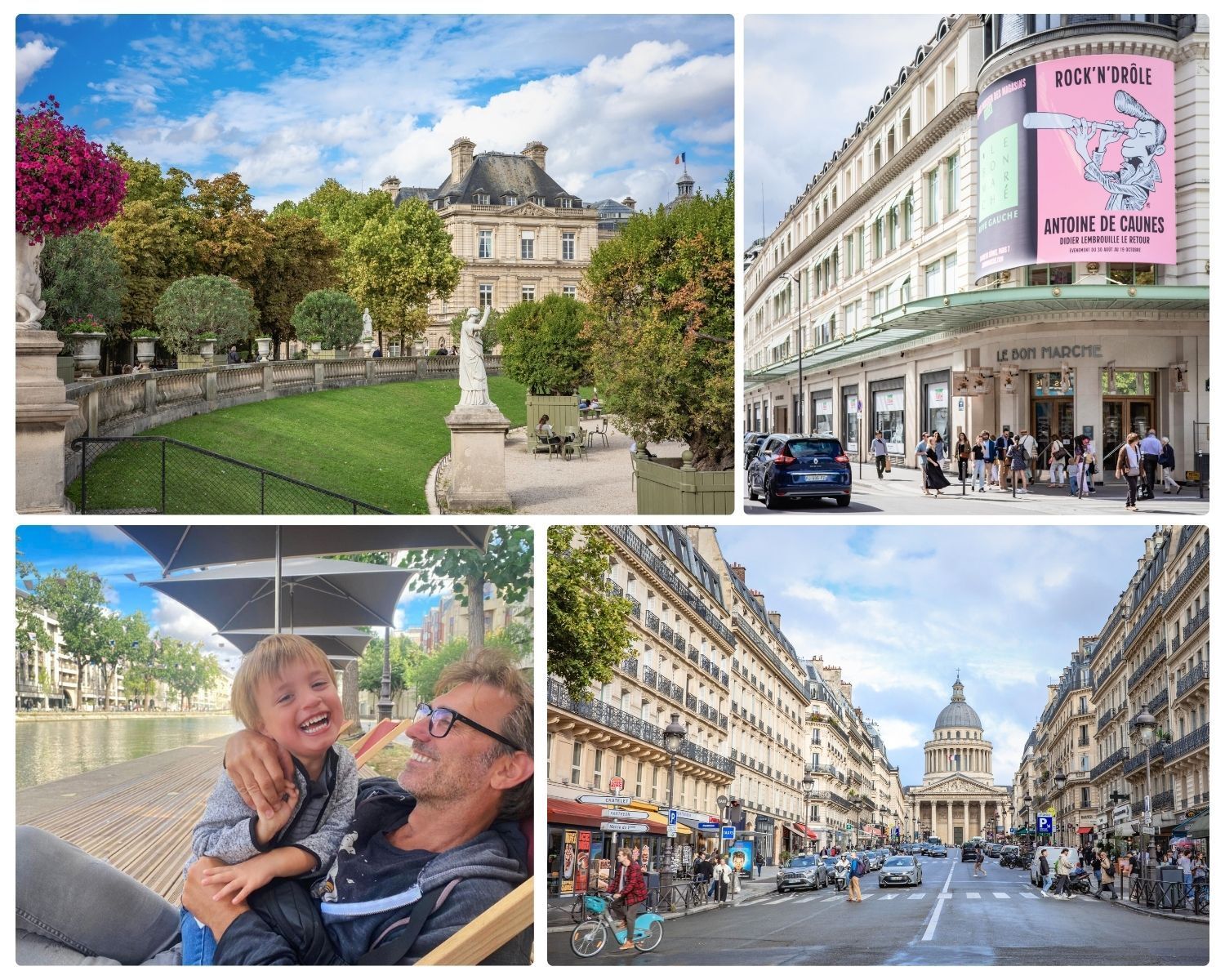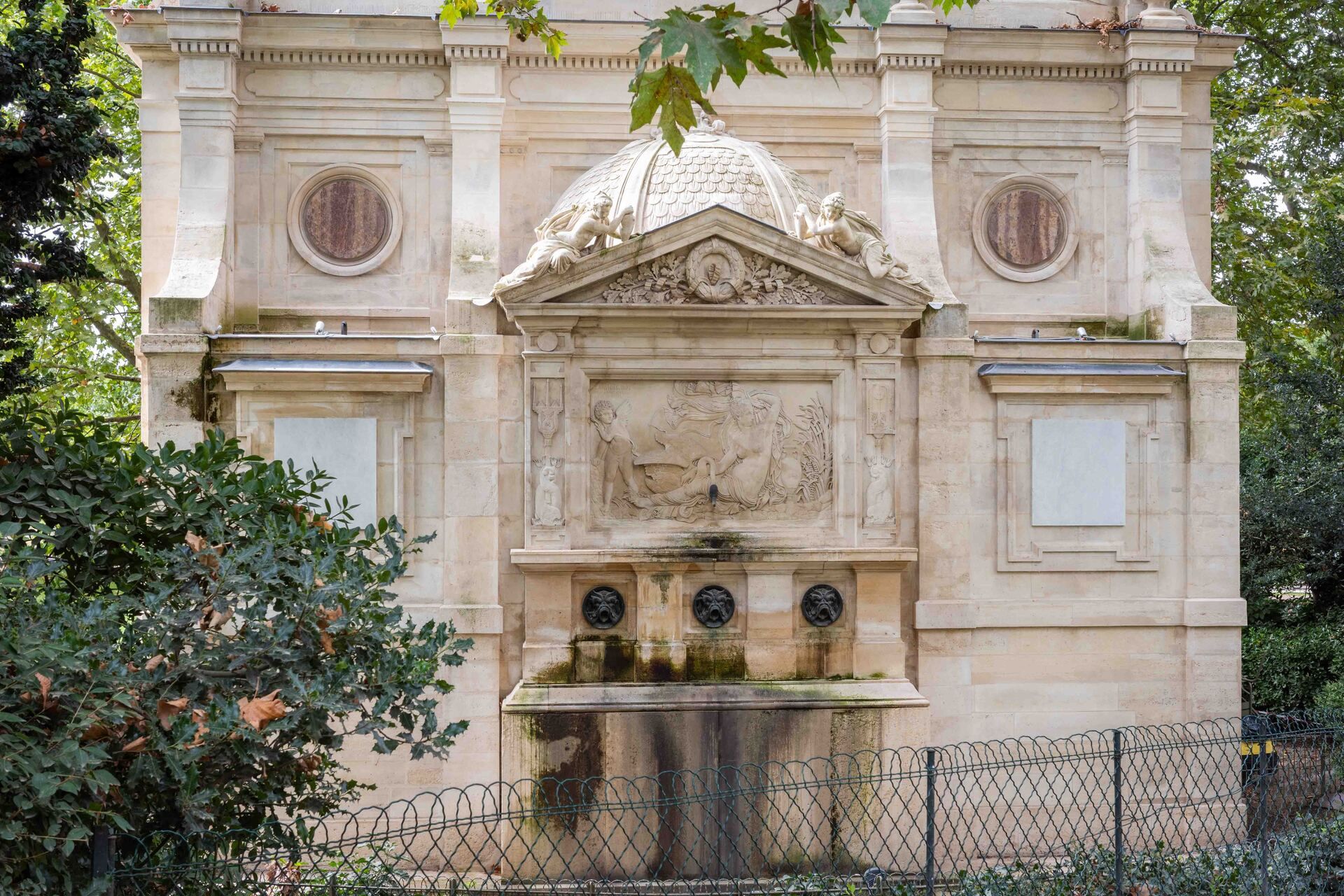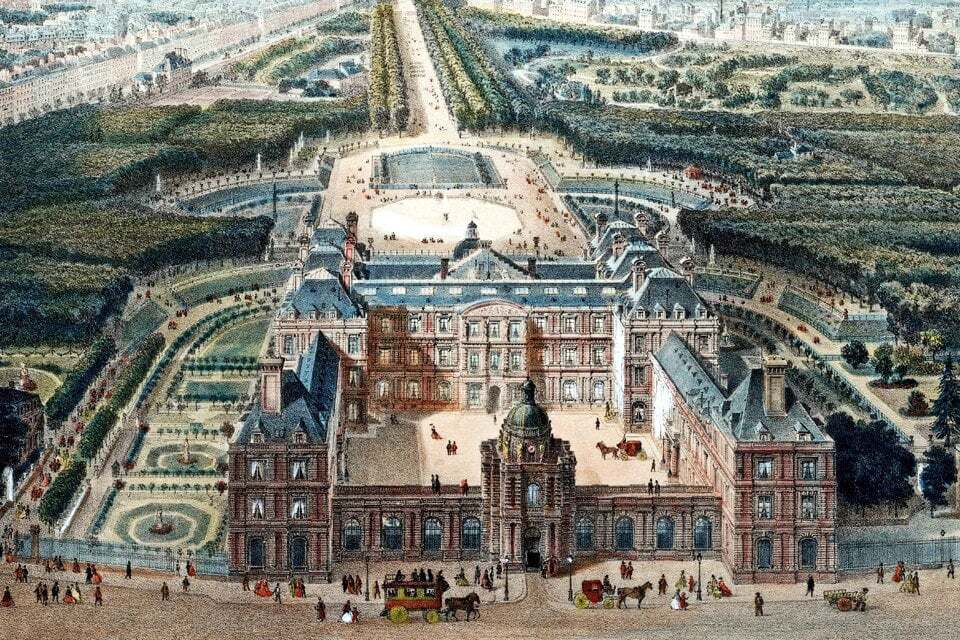- The Paris Love Letter
- Posts
- 🇫🇷 💌 The Paris Love Letter #122
🇫🇷 💌 The Paris Love Letter #122
Hôtel Lutetia + Secrets of Luxembourg Gardens + Hélène Sio - Les ratures
In This Issue of The Paris Love Letter
Our Week In Paris: The Last Days of Summer
Linking You To Paris: Links to Helpful & Fun Articles About Paris
Paris Secrets: Secrets of Luxembourg Gardens
Paris History: Hôtel Lutetia: A Hotel That Witnessed History
Featured French Song: Hélène Sio - Les ratures

Our Week in Paris
Bonjour Friends!
We spent our last weekend of summer exploring the Left Bank, starting with a stroll through Luxembourg Gardens and a visit to the Panthéon. The late summer light was perfect, and the gardens were filled with a peaceful energy that you get before la rentrée, when everyone returns from vacation and Paris gets back to its regular rhythm.

©️ 2025 James Christopher Knight / Mon Petit
For lunch, we grabbed takeaway from La Grande Épicerie at Le Bon Marché and found a nearby park to eat. La Grande Épicerie is massive. It's the gourmet food hall attached to what's considered the world's first modern department store, opened in 1838. The food selection is incredible, with specialties from around the globe.
We had to laugh when we landed in their "North American" section, where Hellmann's mayonnaise was selling for €9. Here we are in Paris, where the local mayonnaise is already excellent, and there's Hellmann’s at nearly double its domestic price.
We also found a spot along the canal at Paris Plage, where we had coffee and croissants in beach chairs. This may have been our last opportunity to enjoy a "Paris beach" until next year.

Linking You to Paris
➡️ Where to stay in Paris: Lonely Planet offers a comprehensive guide on where to stay in Paris, highlighting the best neighborhoods, accommodation options, and tips to help travelers find the perfect base for exploring the city.
➡️ Top Paris Concerts: 2025 - 2026: Paris Discovery Guide features an up-to-date roundup of concerts and live music events in Paris
➡️ Five things they don't tell you about… la rentrée: The Connexion shares five lesser-known facts about “la rentrée,” the annual back-to-school and back-to-work season in France.
➡️ What To Do In Paris in September: HiP Paris shares a guide to September in Paris, highlighting everything from Fashion Week and major art exhibitions to outdoor activities, concerts, and family-friendly events.

PARIS SECRETS
Five Things You Probably Don't Know About Luxembourg Gardens

Luxembourg Gardens
You've strolled the gravel paths, watched kids sail model boats, and admired the palace. But Luxembourg Gardens holds some secrets that most visitors never discover.
It's owned by the Senate, not the city. Unlike other Parisian parks, Luxembourg Gardens doesn't belong to Paris but to the French Senate, making it one of the only private parks in the capital. This means the city police can't intervene here as easily as in other green spaces. The senators literally control their own backyard.
There's a hidden fountain behind the famous one. Hidden behind the Medici Fountain is the Fontaine de Léda, built in 1630, a wall fountain with a sculpture depicting Leda and the Swan. When its original site was destroyed in 1856, the fountain was preserved and moved to the Luxembourg Gardens, attached to the back of the Medici Fountain. Most people never walk around to see it.

Fontaine de Léda
It has a working orchard and greenhouses. Many visitors don't know about the orchard tucked away from the crowds, near the site of the former Carthusian monastery. The gardens also have experimental greenhouses managed by the Senate, complete with varieties of apples and pears created centuries ago.
Marie de Medici never saw her garden completed. The queen who created these gardens was exiled by her own son, King Louis XIII, in 1631 on the advice of Cardinal Richelieu. She never got to see the finished version of the palace and gardens she had commissioned. Family drama, 17th-century style.

Luxembourg Palace and Gardens - 19th Century
It briefly became a prison during the Revolution. During the French Revolution, the palace was transformed into a prison where politicians and hundreds of other prisoners were detained before their executions. The gardens were abandoned, only frequented by families trying to communicate with their imprisoned relatives.
Next time you're relaxing on one of those green metal Senate chairs, remember you're sitting in a place where French senators make decisions, ancient Romans once lived, and royal family feuds played out over centuries.
If you’ve ever been curious what the inside of the palace looks like, check out this YouTube video I found.

PARIS HISTORY
Hôtel Lutetia: A Hotel That Witnessed History

Standing at 45 Boulevard Raspail in Saint-Germain-des-Prés, the Hôtel Lutetia has witnessed some of the most profound moments in Paris’ history. Built in 1910 by the Boucicaut family (owners of Le Bon Marché), this Art Nouveau masterpiece was designed by architects Louis-Charles Boileau and Henri Tauzin to accommodate the department store's international clients and suppliers.
Named after Lutetia, the ancient Roman settlement that would become Paris, the hotel quickly established itself as a gathering place for artists, writers, and intellectuals. In the 1920s, it welcomed the Lost Generation. James Joyce wrote parts of Ulysses here, often with Samuel Beckett serving as his secretary. The hotel's elegant salons hosted orchestras, and its reputation as a cultural haven grew throughout the interwar years.
But the Lutetia's most significant chapter began in the late 1930s when it became a refuge for anti-Nazi German exiles, including Heinrich Mann and a young Willy Brandt. Nazi propaganda disparagingly called them "The Lutetia Crowd." When war broke out in September 1939, the hotel filled with refugees from across Europe, particularly displaced artists and musicians seeking safety in Paris.

Photo Credit: Hôtel Lutetia
The Dark Years: 1940-1944
When the French government evacuated Paris in June 1940 and the Germans occupied the city, the hotel was requisitioned by the Abwehr (German military intelligence). Unlike many other Parisian hotels taken over by the SS or Gestapo, the Lutetia was occupied by the Abwehr, who were "not so bad" compared to other Nazi units. The hotel was used to house, feed, and entertain German officers throughout the occupation.
The transformation was stark. The same elegant salons that had once hosted jazz musicians and literary discussions now served Nazi officials. Many of the hotel's former residents who couldn't escape were captured, while the building itself became a symbol of occupied Paris.

Photo Credit: Hôtel Lutetia
Liberation and Rebirth: 1944-1945
When Paris was liberated in August 1944, Charles de Gaulle ordered that the Lutetia become a repatriation center for prisoners of war, displaced persons, and concentration camp survivors. This decision would create some of the hotel's most poignant moments.
The first camp survivors arrived on April 26, 1945, traveling from Auschwitz, Buchenwald, and Ravensbrück. They came by train, bus, and on foot, arriving at the snow-white facade to find refuge and hope of reuniting with loved ones. The hotel welcomed up to 2,000 arrivals each day.
The Boulevard Raspail was crowded with desperate families holding cards with the names of loved ones they'd lost, while hundreds of photographs of the missing occupied an entire wall of the hotel. Inside, survivors were given food, shelter, 2,000 francs (about $300), and a Red Cross coupon for new clothing.
For many survivors, the transition was overwhelming: "I had dreamed of freedom during the whole deportation. That was freedom, that intolerable loneliness, that room, that fatigue," recalled writer Charlotte Delbo, who had been deported to Auschwitz.

Photo Credit: Hôtel Lutetia
A Living Memorial
Today, a small plaque on Boulevard Raspail commemorates "those who regained their liberty" here, noting that "their joy cannot efface the anguish and the pain of the families of the thousands of disappeared who waited in vain for their own in this place".
The Lutetia has since returned to its role as a luxury hotel, but its wartime history remains an integral part of its identity. After extensive renovations, it reopened in 2018 and was recently taken over by Mandarin Oriental in April 2025, ensuring this historic institution continues to serve guests while honoring its complex past.
As novelist Pierre Assouline, who wrote about the hotel, observed, the Lutetia stands as a place where the most beautiful and most terrible moments of human history intersected under one magnificent roof. It remains both a luxury destination and a profound reminder of resilience, hope, and the capacity for renewal.

FRENCH SONG OF THE WEEK
Hélène Sio - Les ratures
This week I'm sharing "Les ratures" by Hélène Sio. I fell in love with her angelic voice from the first listen. The song feels melancholic, but with a beautiful sadness that you can feel even if you don't understand the lyrics.
Hélène Sio is a 25-year-old singer from Narbonne who began with lyrical singing at nine and was noticed at 16 on The Voice. But her story took a dramatic turn when she suffered a stroke at 15, having to relearn how to speak, walk, and sing. This foundational experience shaped her music, which she describes as "intimate and luminous, where pop is tinged with wounds and resilience."

PARIS LOVE AFFAIR TOURS
Discover Paris With Me
Want to experience Paris beyond the guidebooks? Join me for private walking and/or biking tours for fascinating stories, hidden corners, and local insights that make this city extraordinary. From the bohemian streets of Montmartre to the medieval layers of the Marais, each tour combines history, recommendations, and the kind of authentic discoveries that turn a visit into a love affair with Paris.

The Paris Love Letter is our way of sharing authentic Parisian experiences, hidden gems, and cultural insights while keeping the newsletter free for our readers. To help cover costs, we occasionally include affiliate links for products we genuinely use and recommend at no extra cost to you. We also create our own fine art photo prints, Paris walking tours, and guides to share the beauty and stories of Paris we love. We never take commissions from restaurants. All our recommendations are based on honest experience and genuine appreciation for this city.
